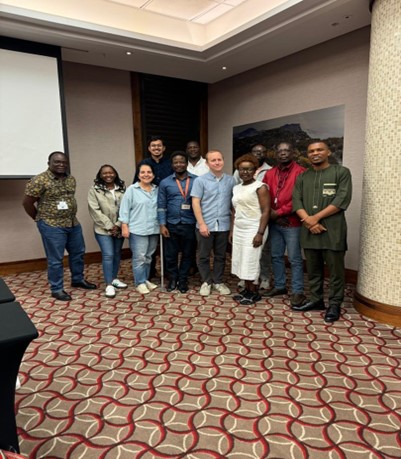Spaces for Change | S4C participated in the 2024 Global CFT Expert Hub Workshop, Reclaiming Civic Freedom from the Security Paradigm: Celebrating Successes, Imagining a Better Future, held in Johannesburg, South Africa. Organized by the European Center for Not-for-Profit Law (ECNL) from November 21 to 23, 2024, the workshop was held on the sidelines of the 12th General Assembly of the World Movement for Democracy to celebrate global achievements in democratic rule and processes. The workshop focused on increasing the capacity of non-profit organizations (NPOs) to use the latest changes and and guidance on Financial Action Task Force (FATF) Recommendation 8 to push back on national level over-regulation, governmental restrictions and other harmful impacts on civil society such as the digital surveillance of activists and civic actors in the name of counter-terrorism and security.
The recent revision of the FATF Recommendation 8 (R8) marked a significant shift in approach, explicitly warning countries against over-regulation of NPOs. This change aimed to protect legitimate NPO activities from unnecessary disruption while retaining the continued implementation of proportionate countering financing of terrorism (CFT) measures. Though the new approach is laudable, the practical implementation of these new guidelines remains problematic, with many jurisdictions continuing to impose restrictive regulatory frameworks on civil society organizations and the NPO sector generally under the aegis of compliance with the FATF R8. In response to these challenges, CSOs have developed innovative countermeasures, such as evidence gathering, policy reform advocacy, tri-sector dialogues, among other initiatives. These countermeasures demonstrate the sector’s resilience and adaptability in facing mounting regulatory challenges. Various sessions of the workshop delved deep into specific case studies from various regions, examining both successful and challenging implementations of the revised FATF R8, providing participants with practical insights for their advocacy work.
In recent years, there have been a surge in the development and deployment of algorithmic-driven biometric surveillance, specifically facial and emotion recognition, which for the most part is incompatible with democracy and human rights, threatening the civic freedoms of all, especially marginalized groups and civil society. Along this line, the workshop equipped participants with the techniques and resources for detecting and pushing back against the deployment of AI biometric surveillance technologies. During the breakout session, S4C shared insights from its latest report, “The Proliferation of Dual-Use Surveillance Technologies in Nigeria: Deployment, Risks & Accountability” stating how the organization is pushing back against the illegal deployment of surveillance technology via evidence gathering to influence change, engage companies, security agencies, and regulators.
Facilitating one of the “solidarity market and peer-to-peer support sessions,” S4C shared its experience in coordinating the Nigerian tri-sector dialogue, the Multistakeholder Working Group on Charities (MSWGC). Borne out of necessity, the MSWGC seeks to address the impact of the blanket application of AML/CFT policies on NPOs by financial institutions (FIs). The MSWGC comprises stakeholders from the NPO sector, FIs, regulators and AML/CFT experts to address and proffer lasting solutions to these challenges. At this session, participants gained practical insights into setting up an effective tri-sector dialogue, with particular emphasis on the MSWGC model. The success of this approach demonstrates how strategic diplomacy and constructive engagement can be more effective in achieving civil society objectives than adversarial tactics. Furthermore, the necessity for contextual adaptation was underlines, as successful implementation of similar initiatives requires careful consideration of each country’s unique circumstances and regulatory environment. This session underscored the value of tailored approaches in developing effective multi-stakeholder engagement strategies. The interactive nature of these sessions allowed participants to explore various models of stakeholder engagement, sharing both successes and challenges in implementing similar initiatives in their respective contexts.
The workshop concluded with a clear call to action for continued collaboration, innovation in advocacy approaches, and sustained engagement with stakeholders at all levels. As the participants return to their respective countries, the knowledge, strategies, and connections gained during the workshop will undoubtedly contribute to more effective advocacy for civic freedoms in an increasingly complex global environment. Looking ahead, the workshop’s outcomes suggest a growing momentum in civil society’s capacity to advocate for balanced regulatory frameworks that protect legitimate NPO activities while addressing security concerns.




